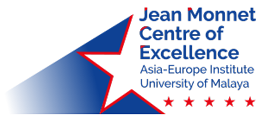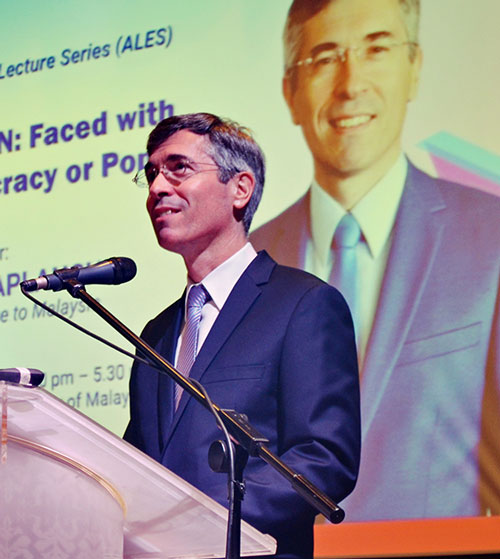
 This year’s Jean Monnet Ambassador Lecture Series (ALES) started with a lecture by His Excellency Frederic Laplanche, the Ambassador of France to Malaysia. The lecture was held at the Auditorium, Asia-Europe Institute on 30th January 2019. The event was well-attended: the audience included more than a hundred people; ambassadors from various countries, high government officials, academics, representatives from the mass media, representatives from NGOs and, of course, students, attended the lecture. The lecture and the following Q&A session lasted from 3:30pm until 5:30pm.
This year’s Jean Monnet Ambassador Lecture Series (ALES) started with a lecture by His Excellency Frederic Laplanche, the Ambassador of France to Malaysia. The lecture was held at the Auditorium, Asia-Europe Institute on 30th January 2019. The event was well-attended: the audience included more than a hundred people; ambassadors from various countries, high government officials, academics, representatives from the mass media, representatives from NGOs and, of course, students, attended the lecture. The lecture and the following Q&A session lasted from 3:30pm until 5:30pm.
H.E. Ambassador Frederic Laplanche began the lecture by expressing his gratitude for being invited to give the talk at the Asia-Europe Institute. He further elaborated that, initially, he was requested to deliver a lecture on the Brexit. However, upon some deliberation, he came up with an alternative topic for his lecture, which was “The EU and ASEAN: Faced with the choice of democracy or populism”. As H.E. Ambassador Frederic Laplanche explained, populism is a matter of domestic politics, not a subject of international politics. However, populism could be a more challenging and pressing issue to tackle because a country’s domestic policy would have a strong impact on its foreign policy. Currently, alarms are sounding all over Europe about the rise and spread of populism in every corner of the continent. However, upon being elected to the office, some European “populists” are unable to proceed with implementing their “populist” policies either due to the political compromises they have to make or—and this is more often the case— because their populist policies are simply not implementable. In France, the people rejected populist politicians during the country’s presidential election in May 2017, when Emmanuel Macron was elected a new president of France.
H.E. Ambassador Frederic Laplanche proceeded to clarify that he may not offer an exact and all-encompassing definition of populism in his lecture. However, he would attempt to highlight and describe some main characteristics of populism. Firstly, as he pointed out, populism involves the rejection of the elite. Populists claim that all elites are self-serving and, therefore, they do not serve the interests of common people. Populist politicians assume the role of the “spokesperson” for the ordinary citizens to condemn the self-serving elite. They often speak in a “straightforward” way without observing political correctness or using “indirect” statements. Secondly, as H.E. Ambassador Frederic Laplanche proceeded to explain, populism is the rejection of liberal democracy. In this aspect, populism could be compared to the authoritarian rule in which a “strong man” uses the “strong hand” to conduct and control the country’s politics. Thirdly, populism is the rejection of the mass media. The mass media establishes and maintains a “checks and balances” system for strong politicians. Populists condemn the mass media as not serving the people interests and not reflecting the people’s voice. Instead, populists prefer using the social media, such as Twitter or Facebook, to spread their version of events or information. Fourthly, populism involves a denial of the “secondary” effects. As H.E. Ambassador Frederic Laplanche maintained, populists tend to focus on the “primary effects” or direct effects of a policy and ignore the “secondary” or indirect effects. Finally, populism rejects globalism. Populists maintain that globalism will destroy the livelihood of ordinary people. He cited an example of the “yellow vests” movement which began in France in November 2018, when people started demonstrating against the rise of fuel prices. The movement started in Paris and soon spread all over France. In response, President Emmanuel Macron, among other measures, promised to have a town hall discussion known as the Grand National Debate to discuss and deal with various problems facing the nation, including the fuel price rise.
Despite the rise of populism, H.E. Ambassador Frederic Laplanche noted some positive aspects in the EU political situation. Firstly, in recent years the EU countries have maintained a relatively high economic growth of 2%, which indicates that people’s economic wellbeing has improved. Secondly, people in the EU continue to give their support to the ideas of the EU and believe in the EU future. Traditionally, as statistics has showed, support for the EU ideas was the weakest in the United Kingdom. However, even after the Brexit referendum in 2016, the approval rate for free movement of the EU citizens remains high in the UK and in 2018 it exceeded 70%.
Finally, H.E. Ambassador Frederic Laplanche elaborated on the vectors for future collaboration between the EU and ASEAN. He expressed hopes that the EU and ASEAN could work together to further enhance the economic and political cooperation and identified several specific areas for such collaborations. He suggested that one area for the EU–ASEAN cooperation could be working together to address the issue of income inequality. The World Equality Report has highlighted a worrying trend of the increasing gap between the haves and have-nots, and a rapidly growing income within the “T10” or the top ten percent income group. The EU and ASEAN countries could work together toward reducing income inequality through encouraging trade liberalization and foreign direct investment (FDI). A second promising area in the EU–ASEAN cooperation concerns the issues of personal security. This would require a collaboration between the EU and ASEAN countries in the efforts to strengthen the police network and anti-terrorism activities. A third area of cooperation could be establishing and maintaining a dialogue on democracy and human rights. The EU and ASEAN countries could work together to promote and uphold values of liberal democracy and human rights. A fourth area of cooperation could be getting the EU and ASEAN engaged in an intellectual dialogue with the civil society that is aimed at reducing the social gap between the elites and ordinary people. The EU and ASEAN countries could work together and cooperate in their efforts to bring the self-serving elites to the grassroots level.
In this public lecture, Dato’ M’ Redzuan Kushairi, Senior Advisor of AEI, was the moderator, and AEI’s Associate Professor Dr. Sameer Kumar was the discussant; he summarized the main points raised in the Ambassador’s talk and provided some insightful comments. Dr. Nurliana Kamaruddin was the master of ceremony.
Prepared by Dr Fumitaka Furuoka
Last Update: 15/12/2021